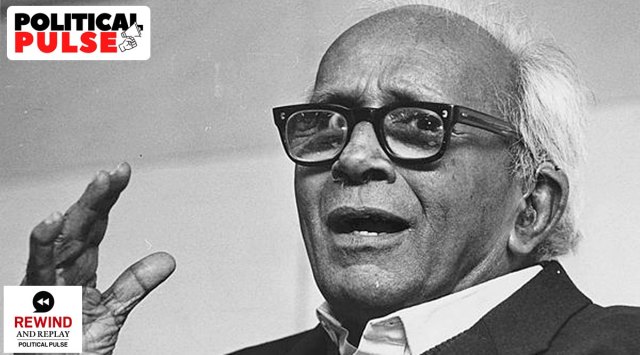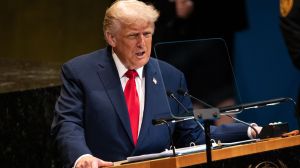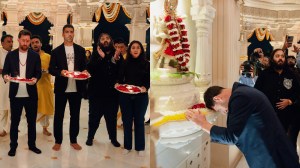A war of words is on in Kerala between the ruling CPI(M) and Opposition Congress over their respective stands on a Uniform Civil Code (UCC), after Prime Minister Narendra Modi suggested a renewed push for it. The state’s large Muslim population has traditionally voted for the Congress, and with the CPI(M) trying to wean them away, the Congress has been digging up the past to puncture holes in the Left’s position.

Now, in the wake of the Modi government’s push, the CPI(M)-led Left Front was the first to call for seminars to discuss a UCC, proclaiming its opposition to it. It also asked the IUML, a Congress ally, to be part of the same, but it decided not to join the CPI(M) plank. The CPI(M)’s position is also reflective of its apprehensions regarding a strengthening BJP in the state.
EMS and CPI(M), 1985-86
In 1985-86, following the Shah Bano verdict and the debate over the Muslim personal law that followed, the CPI(M), then led by general secretary and party legend E M S Namboodiripad, called for the implementation of a UCC. The former CM wrote several articles in the party daily Deshabhimani on the issue, while the party raised the matter in the Assembly.
On August 7, 1985, Deshabhimani published an article titled ‘Move to remove Article 44 will be resisted’, authored by EMS. Article 44 of the Constitution says, “The State shall endeavour to secure for the citizens a Uniform Civil Code throughout the territory of India”.
In the article, EMS wrote: “The allegation is that a UCC will curtail the freedom for polygamy, divorce and denying alimony. This is a call to protest against the verdict. The argument is that it has laid hands on the freedom of the Muslim community. Ibrahim Sulaiman Sait (then Indian Union Muslim League leader) thinks that this approach would get support from Rajiv Gandhi (the then Prime Minister). Does Sait think that there would be Gandhi at the Centre and Karunakaran (then Kerala CM, of the Congress) to support this stand forever?”
EMS continued, “The CPI(M) will not allow cancellation of Article 44… No party that has secular principles as its base can attest to the stand of the League that a UCC is not necessary. The All Indian Muslim League (AIML) quit the LDF after realising that it can’t try to win that aim while in the LDF. Thirty-five years have elapsed since the Constitution came into being. A UCC… has been incorporated in the Constitution. Marriage, family and inheritance rights have to be controlled by a common law, irrespective of caste and creed.”
Story continues below this ad
Apart from many articles in the party daily, in a published compendium on his selected questions and answers, EMS on October 6, 1985, said, “Muslim communalists argue that Article 44 of the Constitution, and the CrPC section that mandates alimony for divorced women, should be scrapped. The Congress in Kerala thinks this demand is justifiable. The CPI(M) is demanding that the section in the Constitution, which envisages a UCC as well as the CrPC section on alimony for divorced women, should not be cancelled. The party is of the opinion that the protest of its organisations, like the All India Democratic Women’s Association (AIDWA), would help speed up the move towards a UCC.”
All India Muslim League and LDF, 1985
A political fallout of the CPI(M)’s stand in favour of a UCC and reforms in Muslim personal law was the AIML parting ways with the CPI(M)-led LDF. In August 1985, the AIML – a breakaway faction of the IUML – decided to sever its 11-year-long alliance with the LDF. The AIML, which had four legislators in the Assembly, later merged with the IUML.
Kerala Assembly, 1985
At the time of the Shah Bano verdict, the Congress-led UDF was in power under K Karunakaran as CM. The LDF’s Leader of the Opposition was E K Nayanar. On July 9, 1985, eight CPI(M) legislators, led by M V Raghavan, K R Gowri and V J Thankappan, raised the issue of a UCC in the Assembly. Indicating the CPI(M) stand in favour of a UCC, Raghavan, then a party heavyweight, asked whether the Union government had sought any opinion from the state social welfare department on creating a conducive atmosphere for a UCC.
“There are a lot of problems in Kerala due to the absence of a UCC. Considering the situation, is the government planning anything to create a favourable situation for implementing the recommendations in the Constitution, and to convince the minorities that a UCC is essential for them?” Raghavan asked.
Story continues below this ad
Another CPI(M) legislator, V J Thankappan, asked whether the government would appoint a “secular official” in the Department of Cultural Affairs for a campaign towards realising a UCC for the country.
CPI(M) MLA C T Krishnan said, “IUML leader Ibrahim Sulaiman Sait has stated that Muslims won’t accept a UCC or the directives of the Supreme Court. Has it come to the notice of the state government?”
Congress minister M P Gangadharan, who replied on behalf of the government, said it was up to the Centre to decide on the matter.
CPI(M) leader E K Nayanar expressed his anguish at the turn of events. “Although the state government’s stand on the issue was sought, it does not matter. The very heading of the Directive Principles is Uniform Civil Code,” he said.

































